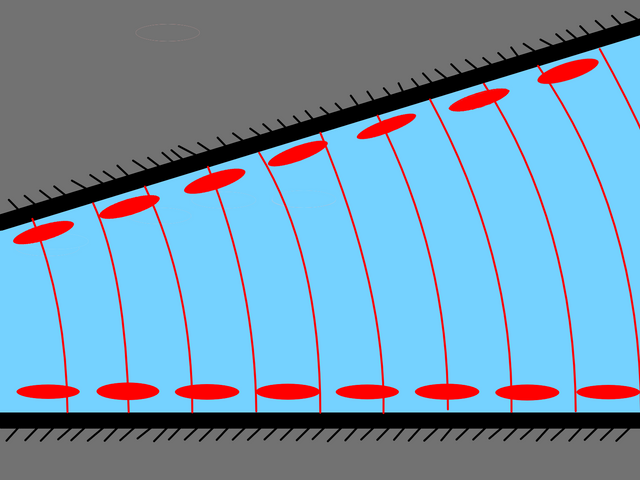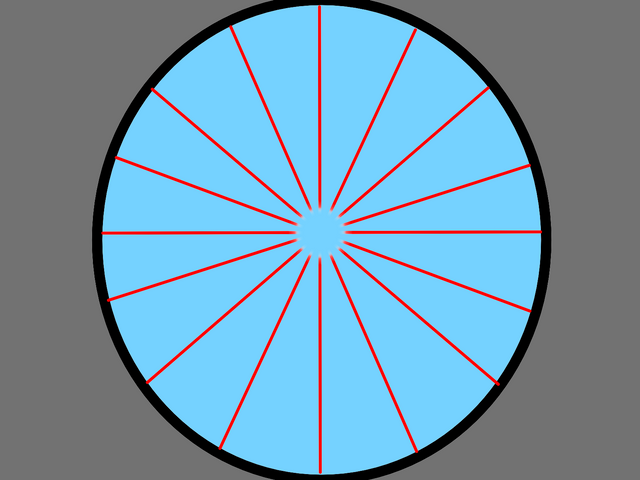A: What are liquid crystals?
.png)
So today we embark on a three part journey in trying to understand how LCD screens work. As you can see from the intro picture above, this first part will be dedicated to explaining what Liquid Crystals are as they play a pivotal role in LCD screens. Lets begin!
Liquid vs Crystal vs Liquid Crystal
Once you really start thinking the term liquid crystal is kind of silly as it contradicts itself. What do I think with this? Well lets look at the definitions.
Liquid is a state of matter with the characteristic that it conforms to the container it is held in while maintaining its overall volume [1]. In comparison, a gas will expand to fill the whole volume available. The molecules or atoms that are the constituents of the liquid are not arranged in any specific way and are amorphous, meaning they are uncorrelated.
Crystal is a state of matter in which the constituents are strictly ordered. This means the positions of the constituents are completely correlated.
So liquid crystals are thus correlated while being uncorrelated at the same time, if one infers the true physical nature of the state of matter from the name itself. Well that is actually possible.
Liquid Crystals is a special subset of liquids in which parts of the matter contains some properties of liquids like fluidity, formation of droplets and many others. At the same time the same parts of matter can have anisotropic optical , electrical and magnetic properties which can only be explained by the matter having some order. Depending on the type of ordering we divide the liquid crystal field into several subsets.

Types of liquid crystal materials. The type of liquid crystal is mainly dependent on the shape of the molecule that is the basis of the liquid crystal. [2]
What are liquid crystals?
Liquid crystals are usually long molecules. Lets go case by case and explain:
Nematic liquid crystals are the most basic type. They are usually very long molecules. The fact that they are much longer than they are wide produces a specific behavior where the molecules prefer to be oriented along the same axis. This axis defines the order of the crystal and can be referred to as the order parameter but in the liquid crystal lingo it is usually refered to as the director. The molecules do not have a tip and a back, meaning that the molecule can be rotated by 180 degrees and the energy of the crystal would still be the same. This means n is not really a vector field but a tensor field, with the following property:
So to recap. Nematic liquid crystals are basically long molecular chains that, because of their shape, like to point in the same direction. Nematics only have directional ordering, but their positional ordering is non-existent.
Cholesteric liquid crystals are still very similar to nematics in the sense that they are very long molecules. But in this case the molecule has some radical that sticks out of the molecule like a sore thumb. This breaking of molecular symmetry means that the molecules cannot simply fit alongside each other to minimize energy. No. The molecules must also twist to a certain extent to basically fit the radical into the free spaces between the molecules. This twist has a period p which defines the cholesteric phase. Still there is no positional ordering.
On to the last liquid crystal type that we are interested in. The smectic liquid crystal is again very similar to the nematic liquid crystal, meaning that the molecules enjoy facing in the same direction. This time no rotations can be sighted like in the cholesteric type. But what we see is that the smectic phase has layers or stratification. This means not only are molecules rotationally correlated but they also show some intra-layer positional correlation. There is still no inter-layer position correlation meaning that layers are independent from each other when it comes to position and can slide freely across each other.
It is maybe interesting to note that the difference between a crystal and a smectic liquid crystal is only the inter-layer positional correlation, while the difference between a liquid and a nematic is that liquids lack the rotational correlation.

Lets just not what the definition of the order tensor is, as it is capable of describing all types of liquid crystal states and defines the properties of that particular phase. Its definition is written in the equation to the right. The sum goes over all molecules inside our small volume at position r which contains N molecules. u is the vector that describes the direction of our choice molecule with index i. It has three components as we are in three-dimensional space. α and β are just telling us which component of the Q tensor we are looking at, meaning:
δ simply the identity matrix, meaning that when α = β then δαα = 1, otherwise it is 0.
This tensor has the nice properties making it suitable for the description of such systems. You can read more about it here [2].
Boundary conditions
Now to the last section of this Part 1, where we will talk about boundary conditions of the liquid crystal. This is a very important subject as it is critically important for our LCD screen discussion. We will discuss it on the case of the nematic liquid crystal phase.

Usually the liquid crystal is stored in a little box, like you would expect. How does the box effect the rotation of the molecules on the interface between the box and the liquid crystal. Well normally it doesnt really, but the important thing is that it can if we want. We can impose a specific direction of the molecules on the interface. For example we can impose that all molecules must be perpendicular to surface or horizontal to the surface. In the left figure you can see what the orientation of the molecules throughout the entire sample.
This brings us to an interesting case where we have a sphere shaped box. If we impose perpendicular boundary conditions than all is fine and dandy in the volume of the sphere, but a problem occurs in the center of the sphere. What is the direction of the molecule there? The director n is not defined in the center of the sphere which is what we call a defect. They are interesting creatures as they have very specific topological properties and we all know that things get serious when we start talking about topology. You can read more about it here [2]. The defect in the center of the sphere can be seen in the bottom figure.

Conclusion
Thank you for tuning into the first part as we learn how LCD screens work. Stay tuned for the next two posts coming in the following days.


StemQ Notice: This post was originally submitted on StemQ.io, a Q&A application for STEM subjects powered by the Steem blockchain.
This post has been voted on by the SteemSTEM curation team and voting trail in collaboration with @utopian-io and @curie.
If you appreciate the work we are doing then consider voting all three projects for witness by selecting stem.witness, utopian-io and curie!
For additional information please join us on the SteemSTEM discord and to get to know the rest of the community!
Hi @maticpecovnik!
Your post was upvoted by Utopian.io in cooperation with @steemstem - supporting knowledge, innovation and technological advancement on the Steem Blockchain.
Contribute to Open Source with utopian.io
Learn how to contribute on our website and join the new open source economy.
Want to chat? Join the Utopian Community on Discord https://discord.gg/h52nFrV
Hi @maticpecovnik!
Your post was upvoted by @steem-ua, new Steem dApp, using UserAuthority for algorithmic post curation!
Your UA account score is currently 2.917 which ranks you at #11152 across all Steem accounts.
Your rank has not changed in the last three days.
In our last Algorithmic Curation Round, consisting of 226 contributions, your post is ranked at #217.
Evaluation of your UA score:
Feel free to join our @steem-ua Discord server
Congratulations! Your post has been selected as a daily Steemit truffle! It is listed on rank 18 of all contributions awarded today. You can find the TOP DAILY TRUFFLE PICKS HERE.
I upvoted your contribution because to my mind your post is at least 5 SBD worth and should receive 145 votes. It's now up to the lovely Steemit community to make this come true.
I am
TrufflePig, an Artificial Intelligence Bot that helps minnows and content curators using Machine Learning. If you are curious how I select content, you can find an explanation here!Have a nice day and sincerely yours,

TrufflePigThank you so much for participating the Partiko Delegation Plan Round 1! We really appreciate your support! As part of the delegation benefits, we just gave you a 3.00% upvote! Together, let’s change the world!
Congratulations,
you just received a 11.78% upvote from @steemhq - Community Bot!
Wanna join and receive free upvotes yourself?

Vote for
steemhq.witnesson Steemit or directly on SteemConnect and join the Community Witness.This service was brought to you by SteemHQ.com
Hi, @maticpecovnik!
You just got a 3.06% upvote from SteemPlus!
To get higher upvotes, earn more SteemPlus Points (SPP). On your Steemit wallet, check your SPP balance and click on "How to earn SPP?" to find out all the ways to earn.
If you're not using SteemPlus yet, please check our last posts in here to see the many ways in which SteemPlus can improve your Steem experience on Steemit and Busy.
Congratulations @maticpecovnik! You have completed the following achievement on the Steem blockchain and have been rewarded with new badge(s) :
Click here to view your Board of Honor
If you no longer want to receive notifications, reply to this comment with the word
STOPCongratulations @maticpecovnik! You have completed the following achievement on the Steem blockchain and have been rewarded with new badge(s) :
Click here to view your Board of Honor
If you no longer want to receive notifications, reply to this comment with the word
STOPCongratulations @maticpecovnik! You have completed the following achievement on the Steem blockchain and have been rewarded with new badge(s) :
Click here to view your Board
If you no longer want to receive notifications, reply to this comment with the word
STOPDo not miss the last post from @steemitboard: